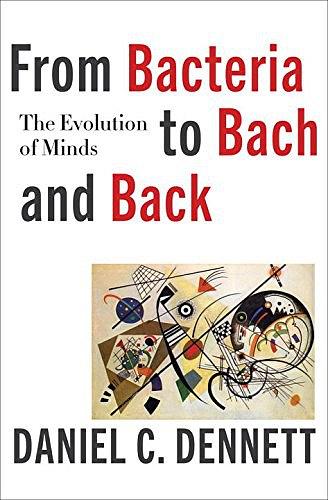
内容简介
One of America’s foremost philosophers offers a major new account of the origins of the conscious mind.
How did we come to have minds?
For centuries, this question has intrigued psychologists, physicists, poets, and philosophers, who have wondered how the human mind developed its unrivaled ability to create, imagine, and explain. Disciples of Darwin have long aspired to explain how consciousness, language, and culture could have appeared through natural selection, blazing promising trails that tend, however, to end in confusion and controversy. Even though our understanding of the inner workings of proteins, neurons, and DNA is deeper than ever before, the matter of how our minds came to be has largely remained a mystery.
That is now changing, says Daniel C. Dennett. In From Bacteria to Bach and Back, his most comprehensive exploration of evolutionary thinking yet, he builds on ideas from computer science and biology to show how a comprehending mind could in fact have arisen from a mindless process of natural selection. Part philosophical whodunit, part bold scientific conjecture, this landmark work enlarges themes that have sustained Dennett’s legendary career at the forefront of philosophical thought.
In his inimitable style―laced with wit and arresting thought experiments―Dennett explains that a crucial shift occurred when humans developed the ability to share memes, or ways of doing things not based in genetic instinct. Language, itself composed of memes, turbocharged this interplay. Competition among memes―a form of natural selection―produced thinking tools so well-designed that they gave us the power to design our own memes. The result, a mind that not only perceives and controls but can create and comprehend, was thus largely shaped by the process of cultural evolution.
An agenda-setting book for a new generation of philosophers, scientists, and thinkers, From Bacteria to Bach and Back will delight and entertain anyone eager to make sense of how the mind works and how it came about.
4 color, 18 black-and-white illustrations
下载说明
1、From Bacteria to Bach and Back是作者Daniel C. Dennett创作的原创作品,下载链接均为网友上传的网盘链接!
2、相识电子书提供优质免费的txt、pdf等下载链接,所有电子书均为完整版!
下载链接
热门评论
-
sophie的评论思路很清晰也很有趣,就是论述太啰嗦(举例简直是灾难,试图幽默地举例是重大灾难)。最后两页的概述很漂亮,想了解大致观点直接读这两页就可以了。
-
·的评论3.5。赞思路,例子精简一下就更好了
-
liuxin3272005的评论囫囵吞枣的看完丹内特的意识进化和解释,为什么我觉得他多少具有康德的革命性!我们都是基因和模因共同演化出来的产物,而演化论的视角的确可以作为思维工具和哲学方法论。总之感觉自己的视野提升了,视角也增加了,腰不酸腿不疼了,不过这可能也是意识的幻觉,哈哈!最后对AI恐慌的讨论也很精准,即使深度学习,AI最多达到波普尔生物的认知水平,具备贝叶斯试错能力。与其担心人工智能,不如担心人类自己的自负和非理性,放弃思考把重大决定权交给机器才是悲剧。对AI的过度拟人化,被他们的声音和视觉形象误导,可能类似于让宠物狗来教育孩子。所以,机器归机器,幻觉归幻觉,意识归意识。如果AI想提高自己的读心术,增强帮我们做决定的能力,让它滚!如果AI帮我们提升自己做出理性决策的能力,让它来!
-
鸟的评论啰哩啰嗦不知道讲些什么
-
ocean11的评论最近才知道,作者是无神论四骑士之一,其他三人的书都读过,这是第一次读他的。competence和comprehension,行未必知,知未必行,第一处棒喝。罗嗦是当然的,要面对信仰上帝的大多数,讲解自然选择下意识和智能之诞生,对付读者认知惯性何等艰难。Matt Ridley那本就是小学生习作。可能是今年读过最重要的一本书,进化论、信息论、笛卡尔、AI等等,至少需要重读两遍。
-
bks的评论Human brain is a work of nature and man-made selection. Comprehension emerges out of competence. Consciousness is a user-illusion..
-
J!N的评论太啰嗦
-
dingli的评论偏哲学,大部分在说语言,meme,文化的进化
-
gavagai的评论打call
-
地中海胖叔的评论写得不好。扯东扯西却没啥说服力。
-
飞机的评论整体来说这是一本关于进化、文化、意识、认知方面全面思考的书。有好几个想法,比如competence without comprehesion,很新颖,确实很好地articulate了好几个杂糅在一起的问题。很受益。
-
小明的花园的评论意外收获啊,刚开头挺难懂的,后来稍微看明白书的观点了。打算刷两遍。
-
HX品味装饰的评论心灵如何产生?简单的回答,心灵是一种思维工具,它不断地进化,以至于到了能够知道自己存在,甚至知道自己如何进化的程度。怎样的思维工具?词语,听说读写,画地图,制作罗盘,望远镜,电脑,互联网,等等。我们知道病毒的存在,狗不知道,海豚,猩猩也不知道。我们是唯一有思维工具的物种。
-
Sra. Elisa的评论In Praise of Serendipity.创造性因素——技术进步的节奏、大公司的垄断、资源的限制、利益集团的力量、乃至于人的心态。 "气度",是个被忽略了的素质。不计较得失,心里有一件“大”事,我特别佩服这样气度的人。Why Power Brings Out Your True Self. 权力对你的个人作用是能暴露和放大你的品质。
